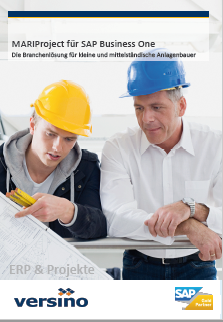the production with batch size 1 can be found in many different industries. plant builderThe manufacturers addressed are often still working with stand-alone solutions instead of integrated business applications. The individual and contract manufacturers mentioned often still work with stand-alone solutions instead of integrated business applications. Yet there are so many ERP systems for manufacturing companies.
Individual and contract manufacturers are different
The challenges for individual and contract manufacturers are manifold and often differ significantly from those of series manufacturers. Orders lasting several months, sometimes several years, must be reliably planned and organised. At the same time, however, there are no basics such as work plans or BOMs which are indispensable for repetitive production.
ERP systems for series production concentrate on the analysis of material requirements. The focus here is on the optimal utilisation of production and the optimisation of factors such as set-up times. ERP software must keep this production information networked. An ERP system can optimise the procurement and production process on the basis of complete information. And it does this in advance.
However, the prerequisites are different in one-off and contract manufacturing.
The mission set in a project can only be planned based on provisional structures. This plan must then be permanently adapted to the course of the project.
The mechanical and plant engineering industry often speaks of a "growing parts list" approach. In principle, however, this does not yet describe the full complexity of project-orientated production. After all, it is not only materials and components that have to be constantly organised and adapted for a specific order or project. The use of often expensive employees and other resources must also be adapted by the individual and contract manufacturer to the often constantly changing conditions.
MariProject for plant engineering
Optimal purchasing for make-to-order and contract manufacturing
Another important role is played by project-controlled purchasing. On the one hand, it is clear that even in one-off production, purchasing should be done as early as possible. The possibility of achieving good purchase prices increases with the lead time. At the same time, however, optimising delivery is essential. Early or late delivery (to the right place) can lead to significant burdens on the project.
Top topic for individual and contract manufacturers: liquidity
However, one of the most important issues for companies in make-to-order and contract manufacturing is the control of the liquidity. In view of the six to eight-figure investments with which projects have to be pre-financed, this is not surprising. Errors in the calculation and planning can often have life-threatening consequences. The financing banks demand deep insight into the books and planning of the individual and contract manufacturers, in accordance with stricter guidelines for granting money.
One ERP Software can only support this if the business aspects are deeply rooted in project management.
Individual and contract manufacturing is also maintenance and service
Individual and contract manufacturers want to and should also generate sales with their customers after the completion of the orders. After-sales topics such as service, Maintenance, maintenance and reengineering are required or present themselves. Very few ERP systems for series manufacturers are equipped for these topics. Spare parts management, maintenance plans, service control, field service and much more are becoming increasingly important and should be controlled by integrated software.

MARIProject ? Version 7.3.000

Plant construction projects or mechanical engineering projects

Order bills of materials in mechanical and plant engineering

With MariProject for integrated project calculation

MariProject 6.6 for plant construction companies



